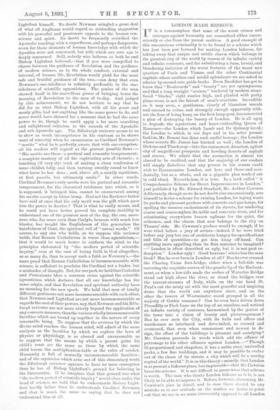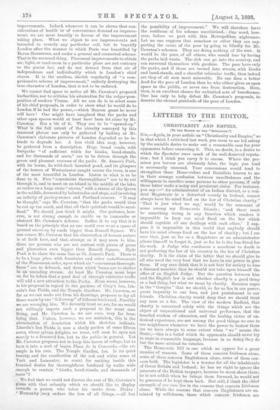LONDON MADE HIDEOUS.
IT is a commonplace that some of the worst crimes and outrages against humanity are committed either uncon- sciously or else from the purest motives. A good example of this unconscious criminality is to be found in a scheme which has just been put forward for making London hideous, for taking away that unique and subtle charm which belongs to the greatest city of the world by reason of its infinite variety and infinite contrasts, and for substituting a base, brutal, and blundering imitation of the worst features of the worst new quarters of Paris and Vienna and the other Continental capitals whose soulless and sordid splendours we are asked to admire by second-rate guide-books. Even Baedeker has got to know that " Boulevards " and " beauty " are not synonymous, and that a long straight " avenue " bordered by modern stone- faced " blocks," eight stories high, and planted with perky plane-trees, is not the fairest of man's creations. Incredible as it may seem, a gentleman, clearly of blameless morals and unused to crime, and strangely enough apparently with- out the fear of being hung on the first lamp-post, has concocted a plan of destroying the beauty of London. He is all agog to degrade the mysterious and heart-enthralling Queen of Romance—the London which Lamb and De Quincey loved ; the London to which, in our days and in his sober prosaic fashion, Mr. Besant has done such useful homage; the London whose secrets Mr. James has learned so well ; the London of Dickens and Thackeray—into the commonest, dreariest, ugliest city of magnificent prospects and howling deserts of asphalt and stucco. We admit that the accusation is almost too absurd to be credited, and that the majority of our readers will simply disbelieve that any person in his senses could wish to Hausmannise London, not here and there and acci- dentally, but as a whole, and on a gigantic plan worked out in cold blood. Nevertheless, it is true. In a book called " A Comprehensive Scheme for Street Improvements in London," just published by Mr. Edward Stanford, Mr. Arthur Cawston deliberately, though as we do not doubt also unconsciously, sets himself to devise a scheme for ruining London, for laying waste its parks and pleasant gardens with concrete and gas-lamps, for spoiling the sinuous enchantment of its streets, for rendering coarse and commonplace its noble and romantic river, and for substituting everywhere brazen ugliness for the quiet, the reticence, and the charm that now belongs to the city on Thames' side. Mr. Cawston's preface would be enough, if he were tried before a jury of artists—indeed, if he were tried before any jury but one of architects hungry for specifications and bills of quantities—to get him hung off-hand. Can anything more appalling than its first sentence be imagined P —" London is often described as ugly, but it is not past re- demption." London ugly ! Good heavens ! where has the man lived P Has he ever been in London at all P Has he ever crossed the Charing Cross foot-bridge, either when a full-tide was caressing the exquisite curves of the granite lip of the Embank. ment, or when a low-tide made the arches of Waterloo Bridge stand out high above the river, as stand the bridges over the torrent-streams of Italy, while on the one hand St.
Paul's out the misty air with the most graceful and inspiring dome that the world can anywhere show, and on the other the towers of Westminster stood grouped in all the majesty of Gothic romance P Can he even have driven down Piccadilly or Park Lane on the top of an omnibus, and noticed an infinite variety of contours, harmonised by the genius of the town into a vision of beauty and picturesqueness ? Has he ever seen the City, with its halls and offices and warehouses so interlaced and dove-tailed, so crossed and countered, that even when commonest and newest in de- sign, the effect of the buildings is pleasant and satisfying P Mr. Cawston proceeds in words which add the offence of patronage to his other offences against London :—" Though ill-proportioned and shapeless, it has a noble river, unrivalled parks, a few fine buildings, and it may be possible to evolve out of the chaos of its streets a city which will be a worthy capital of the world." It is on this theory—namely, that London is at present a hideous place, but improvable—that Mr. Cawston bases his scheme. It is not difficult to guess what that scheme is worth. The man who thinks London hideous as it is, is not likely to be able to improve it. Before, however, discussing Mr. Cawston's plan in detail, and in case there should be any mistake as to our attitude on the matter, we desire to point out that we are in no sense irrevocably opposed to all London improvements. Indeed, whenever it can be shown that con- siderations of health or of convenience demand an improve- ment, we are most heartily in favour of the improvement taking place. What we object to are improvements not intended to remedy any particular evil, but to beautify London after the manner in which Paris was beautified by Baron Hausmann, and under a general and connected scheme. That is the accursed thing. Piecemeal improvements to obtain air, light, or road-room in a particular place are not contrary to the genius loci, and do not detract from that air of independence and individuality which is London's chief charm. It is the soulless, slavish regularity of " a com- prehensive scheme of improvement," entirely destroying the true character of London, that is not to be endured.
We cannot find space to notice all Mr. Cawston's proposed barbarities, nor to criticise his admiration for the vulgar pom- posities of modern Vienna. All we can do is to select some of his chief proposals, in order to show what he would do to London if he had the power,—which Heaven grant he never will have ! One might have imagined that the parks and other open spaces would at least have been let alone by Mr. Cawston. Not a bit of it. They are to be " opened-up." What is the full extent of the atrocity conveyed by this innocent phrase can only be gathered by looking at Mr. Cawston's elaborate pictures of London degraded as he in- tends to degrade her. A less vivid idea may, however, be gathered from a description. Huge broad roads, with footpaths " of sufficient width for kiosks, band-stands, and for thousands of seats," are to be driven through the green and pleasant recesses of the parks. St. James's Park, with its lawns, its wild-duck haunted pond, and its glimpses of the towers of Westminster caught across the trees, is one of the most beautiful in London. Listen to what is to be done to it. Five " convenient thoroughfares" are to be out through it, and to meet on an island in the middle of the lake, or rather on a huge stone " circus," with a statue of the Queen in the middle, decorated by balustrades and steps, and involving an infinity of paving-stones and Portland cement. "It may be thought," says Mr. Cawston, "that the parks would thus be cut up too much, and that all their quietude would be sacri- ficed." We should just think it might. Our patience, how- ever, is not strong enough to enable us to transcribe or abstract Mr. Cawston's defence. Suffice it to say that it is based on the principle that no one could ever wrait a space of ground uncut-up by roads bigger than Russell Square. We can assure Mr. Cawston that his observation of human nature is at fault here, and that, strange, as it may seem to him, there are persons who are not content with pieces of grass and plantation even bigger than Russell Square. Hyde Park is to share the same fate as St. James's Park. There is to be a huge place with fountains and other cmbellissements of the Hausmann order, upon which six " convenient thorough- fares" are to debouch, and down which 'buses are to clatter in an unending stream. At least Mr. Cawston must hope so, for he infers that a good deal of through vehicular traffic will add a new attraction to the. Parks. ,Even worse, however, is his proposal in regard to the gardens of Gray's Inn, Lin- coln's Inn Fields, and the Temple Gardens. Mr. Cawston, as far as we can make out from his drawings, proposes to lay all these waste by one "fell swoop" of hideous boulevard. Possibly we are wronging him. We devoutly trust we are, for we would not willingly impute such a proposal to the worst man living, and Mr. Cawston is, we are sure, very far from being that. Unless, however, we are mistaken, this is the abomination of desolation which his sketches indicate. Lincoln's Inn Fields is now a shady garden of some fifteen acres, whose sylvan delights, we trust, will soon be open not merely to a favoured few, but to the public in general. Yet Mr. Cawston proposes not to keep this haven of refuge, but to turn it into a sort of bogus Place de la, Concorde,—the ex- ample is his own. The Temple Garden, too. Is its quiet beauty, and the recollection of the red and white roses of York and Lancaster, to count for nothing beside this frenzied desire for thoroughfares bordered by walks wide enough to contain " kiosks, band-stands, and thousands of seats"?
We feel that we could not discuss the rest of Mr. Cawston's plans with that urbanity which we should like to display towards a person who takes his motto from Fichte : " Humanity [may endure the loss of all things, — all but the possibility of improvement." We will therefore leave the residuum of his scheme uncriticised. One word, how- ever, before we part with this Metropolitan nightmare. Let no one suppose that somehow or other they are sup- porting the cause of the poor by going in blindly for Mr. Cawston's schemes. They are doing nothing of the sort. It would be the poor, of all others, who would lose by having the parks laid waste. The rich can go into the country, and can surround themselves with gardens. The poor have only the parks, and if those are turned into streets, with kiosks and band-stands, and a cheerful vehicular traffic, then indeed are they of all men most miserable. No one does a better deed for the poor of London than he who either gives an open space to the public, or saves one from destruction. Here, then, is an excellent chance for unlimited acts of beneficence.. One has only to help defeat Mr. Cawston's proposals, to deserve the eternal gratitude of the poor of London.



































 Previous page
Previous page